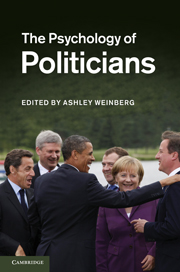Book contents
- Frontmatter
- Contents
- Figures
- Tables
- Acknowledgements
- Contributors
- 1 The psychology of politicians
- Part I Becoming politicians
- Part II Being at the centre of things
- Part III Coping with pressure?
- Part IV People as politicians
- 9 The political side of personality
- 10 Where red dictators coexist with promising democrats
- Index
- References
9 - The political side of personality
Published online by Cambridge University Press: 05 December 2011
- Frontmatter
- Contents
- Figures
- Tables
- Acknowledgements
- Contributors
- 1 The psychology of politicians
- Part I Becoming politicians
- Part II Being at the centre of things
- Part III Coping with pressure?
- Part IV People as politicians
- 9 The political side of personality
- 10 Where red dictators coexist with promising democrats
- Index
- References
Summary
Personality and politics
Politics involves institutions, systems of norms and principles of power management, ideally designed and set in motion for the common good. Personality involves intra-individual systems and self-regulatory mechanisms that guide people towards achieving individual and collective goals, while providing coherence and continuity in behavioural patterns and a sense of personal identity across different settings (Bandura, 2001; Caprara and Cervone, 2000; Mischel and Shoda, 1998). Just how such societal and individual systems might be related has long been a source of speculation and serious concern for philosophers, political scientists, psychologists, and laypeople. In the past, these entities were conceptualised as functioning at different levels and with different operational structures, but current views tend to emphasise communalities rather than diversities and point to reciprocal interactions between politics and personality. Governmental institutions have been created and designed to set and preserve conditions that allow society to function in harmony and individuals to experience satisfaction in their lives. Political discourse shapes basic perspectives on options, goals, attitudes, and values, but as citizens bring to the political arena needs and aspirations for personal and social well-being, they in turn influence the agenda of politics no less than the behaviour of politicians. Politics in modern democracies aims to be the realm within which citizens can operate through institutions and endorse obligations aimed to pursue optimal conditions for personal, social and communal growth. Such ambitious goals cannot be fully appreciated without clarification of the psychological processes underlying political choices, consent formation, concerted political action and effective governance. That quest invigorates investigation of the synergistic influence of affect and cognitive reasoning that leads to political preferences, decisions and actions. It also encourages new understandings of the role of leaders’ and followers’ personalities.
- Type
- Chapter
- Information
- The Psychology of Politicians , pp. 171 - 202Publisher: Cambridge University PressPrint publication year: 2011
References
- 1
- Cited by



